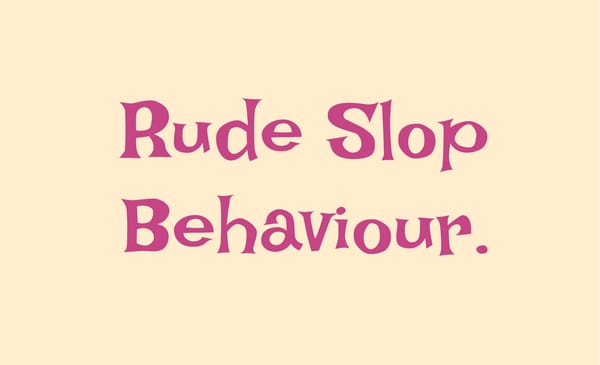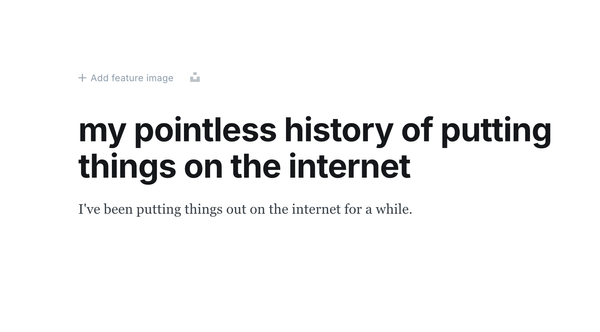Good art is compression
Is art paintings, sculpture, architecture, theatre, dance, film, poetry, literature, craft and criticism? It's hard to describe it in concretions. Sometimes concretions aren't enough. Let me try something more abstract—to me, good art is powerful compression.
The human condition is vast and complex, the only way to not be overwhelmed is to compress and compress more. <!--more--> For example, take a situation where a stranger messages me "hi" and then refuses to elaborate further until I respond. My brain has a vast repertoire of past experiences and memories that imbues a lot of meaning into this "hi".
I have a vague recollection of when I was a 10-year-old who uploaded reviews of phones lying around the house to YouTube, only to receive a couple of racist comments ("Apu's child lololol"), accompanied by some fairly perplexing and nonsensical one-word comments like "hi".
I remember when I got a strange spike of strangers in college finding my number and messaging me "hi", waiting for me to respond. And when I did, they would start their rehearsed Ponzi scheme spiel.
In that same period, I started a college club to promote open source software, only to have hordes of college students wanting in solely to pad their résumés (instead of, you know, talk about open source software). They had a tendency to "hi" and dip. A chat with one such person escalated to the point of them sending me a picture of his ailing aunt on a ventilator next to a tray containing a reddish-pink mass that used to be inside that aunt, all as an excuse to extend a deadline for him to send over a registration.
Speaking of deadlines, I recall when I had to work against a really tight one while fighting a race against burnout. That fine day, 3-4 individuals pinged me "hi" on the corporate messenger in the span of a few hours, terribly fragmenting what was supposed to be much-needed focus time.
Think of all the rich concepts I have inadvertently brought up like YouTube channels, racism (and racist YouTube commenters), deadlines, undefined organs, résumés, incompetent people, ponzi schemes, and scattered focus time, along with all the second and third-order concepts that sit behind the concepts that I've already mentioned. All of these experiences and concepts have in turn built up my concept of someone messaging "hi" and refusing to elaborate, which is further compressed to a single short spike of something that I can succinctly describe as annoyed.
A big network of concepts and ideas is always hidden behind every concept or feeling in the foreground.
"What does any of this have to do with art?", you may ask.
To me, the most powerful and moving art compresses a lot of aspects of the human condition into a compressed something. The something may be paintings, sculpture, architecture, theatre, dance, film, poetry, literature, craft and criticism, but it could be something else too.
I have my preferences for art and it's not usually poetry, but let's take the example of this enduringly famous poem, Ozymandias, since it demonstrates my point quite well on this medium:
I met a traveller from an antique land Who said: "Two vast and trunkless legs of stone Stand in the desert. Near them, on the sand, Half sunk, a shattered visage lies, whose frown, And wrinkled lip, and sneer of cold command, Tell that its sculptor well those passions read Which yet survive, stamped on these lifeless things, The hand that mocked them and the heart that fed: And on the pedestal these words appear: 'My name is Ozymandias, king of kings: Look on my works, ye Mighty, and despair!' Nothing beside remains. Round the decay Of that colossal wreck, boundless and bare The lone and level sands stretch far away
So much compression! If I try to expand on the layered concepts brought about by this sonnet, this would be a long essay indeed. But I shall only invoke a few phrases that convey that there's a lot to read between the lines—an ancient kingdom that was once great and has now fallen, cold dictators, skilled sculptors, imprints of the past, irony and hubris, etc. And all of these have analogues to things that happen in our world today—in a way, it's a commentary on the human condition.
I'd suggest you pick your favourite art (of any form), and you are likely to notice the fantastic material-to-meaning ratio. It doesn't have to be words. Even an instrumental section of music may invoke a lot of feelings and memories, all compressed into a span of a few seconds.
I rest my case.
Appendix: Is programming art?
By my definition, programming or algorithms could be art, but it rarely is. While there is definitely a compression of concepts and a building of abstractions, not a lot of it has much to say about the human condition.
Some of it is approaching artsyness though, like algorithms that are inspired by natural processes. Or a metacircular evaluator that mirrors some cyclical aspects of life.



